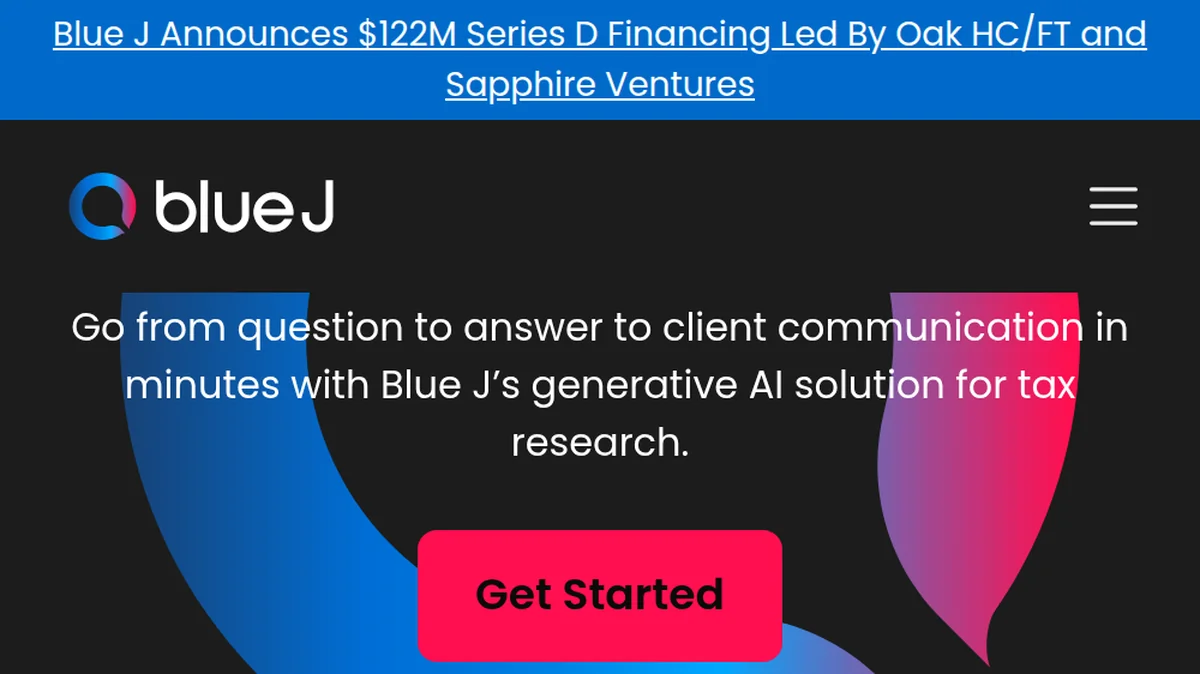AI Research
Blue J Lands $122M Series D to Advance AI Tax Research

Blue J secured $122 million in Series D funding for its GenAI tax research platform.
Oak HC/FT and Sapphire Ventures co-led the investment round.
The capital will accelerate team expansion, product development, and market reach.
Blue J, a leading GenAI tax research platform, secured $122 million in Series D funding. Oak HC/FT and Sapphire Ventures led this investment round. Intrepid Growth Partners, Ten Coves Capital, and CPA.com also participated. This Series D round follows the company’s Series C seven months prior.
The Toronto-based company will use the capital to accelerate team expansion, product development, and market reach. Blue J’s platform leverages advanced generative AI to provide instant answers to complex tax questions. It covers U.S. federal, state, local, Canadian, and UK tax law. Unlike traditional tools from providers like Thomson Reuters, Blue J offers a conversational interface.
Accelerating AI Tax Research
Blue J doubled its revenue and customer base in the first half of 2025.
The platform now serves tens of thousands of tax professionals across thousands of organizations. Over 70% of users log in weekly. Since January 2025, Blue J has grown to over 80 employees. Its new customer acquisition rate has also doubled. This Series D investment positions the company as a key player in the evolving fintech and legal tech sectors, differentiating itself from competitors such as LexisNexis.
AI Research
Nigeria jumps from zero to 20 AI research papers in 18 months

Nigeria has published 20 peer-reviewed artificial intelligence (AI) compute research papers in less than two years, up from zero, in a sign of the government’s push for Nigeria’s entry into the global conversation on AI research.
That jump is thanks to the Nigerian Artificial Intelligence Research Scheme (NAIRS), a federally funded program designed to stop the country from being a mere exporter of talent and instead anchor research output under Nigerian institutions.
Launched in early 2024 by the Ministry of Communications, Innovation, and Digital Economy, and funded through the National Information Technology Development Agency (NITDA), NAIRS seeks to address a structural gap: while Nigerians abroad were contributing thousands of AI papers, none were credited to local universities or labs, leaving the country with little to show under its own name.
“We discovered thousands of AI papers authored by Nigerians, but none tied to Nigerian institutions,” Olubunmi Ajala, National Director of the National Centre for Artificial Intelligence and Robotics, told TechCabal on the sidelines of GITEX Nigeria in Abuja on Monday. “That’s why NAIRS was created, to give Nigerian researchers, both at home and in the diaspora, a structured platform to produce Nigeria-led AI research.”
Over 4,000 researchers applied to the first NAIRS call, with 45 consortia of academics and startups eventually selected. Each group received grants of up to ₦5 million ($3,400) and a mandate to publish within a year in one of five thematic areas: agriculture, healthcare, education, sustainability, and utilities.
By August 2025, the results were in: 20 peer-reviewed papers, two of them in Springer journals, and several projects already tested in the field. One agricultural consortium used YOLOv8 computer vision models to detect “tomato Ebola,” a disease that wipes out harvests. Another built a smart traffic management system that replaces Nigeria’s fixed 60-second light cycles with an adaptive model, allocating green light time based on real-time traffic flows.
“These are not just academic exercises,” Ajala said. “They are practical solutions tested with real data, designed to solve problems that directly affect Nigerians.”
The initiative is also building long-term infrastructure. Through the AI Collective, a network of over 2,000 Nigerian AI practitioners globally, participants share data, mentor students, and form syndicates to commercialise work.
Ajala said the next phase is to push for patents, biotech applications, and scalable startups.
“Once strong research outcomes begin to emerge, funding naturally follows,” he said. “Global partners are keen to see how AI can address African realities, and Nigeria is beginning to provide answers.”
Mark your calendars! Moonshot by TechCabal is back in Lagos on October 15–16! Join Africa’s top founders, creatives & tech leaders for 2 days of keynotes, mixers & future-forward ideas. Early bird tickets now 20% off—don’t snooze! moonshot.techcabal.com
AI Research
New Akamai-Commissioned Research Reveals GenAI is Driving “The Edge Evolution”: 80% of APAC CIOs to Rely on Edge Services by 2027 to Support AI Workloads
- Akamai-commissioned research reports future-proofing digital business infrastructure as the top technology initiative for CEOs in Asia-Pacific organizations
- Leading analyst firm predicts that by 2027, 80% of CIOs will turn to edge services from cloud providers to meet the performance and compliance demands of AI inferencing
- 31% of enterprises have moved GenAI applications into production, with 64% in testing phase, forcing an infrastructure rethink
SINGAPORE – Media OutReach Newswire – 2 September 2025– As generative AI becomes essential to business operations, organizations are being forced to rethink outdated infrastructure models, finds a new IDC research paper commissioned by Akamai Technologies (NASDAQ: AKAM), the cybersecurity and cloud computing company that powers and protects business online. According to the research paper titled “The Edge Evolution: Powering Success from Core to Edge,” Asia-Pacific (APAC) enterprises are realizing that centralized cloud architecture alone is unable to meet the increased demands of scale, speed, and compliance. It is crucial that businesses rethink and enhance infrastructure strategies to include edge services to stay competitive and compliant, and be ready for real-world AI deployment.
According to the IDC Worldwide Edge Spending Guide – Forecast, 2025, public cloud services at the edge will grow at a compound annual growth rate (CAGR) of 17% through 2028, with the total spending projected to reach US$29 billion by 2028. In addition, in the latest research paper, IDC predicts that by 2027, 80% of CIOs will turn to edge services from cloud providers to meet the performance and compliance demands of AI inferencing. This shift marks what is emerging in the paper as “The Edge Evolution.”
The research paper further outlines how public cloud-connected systems combine the agility and scale of public cloud with the proximity and performance of edge computing, delivering the flexibility businesses need to thrive in an AI-powered future.
The AI infrastructure reality check
As generative AI moves from experimentation to execution, enterprises across APAC are confronting the limits of legacy infrastructure. Today, 31% of organizations surveyed in the region have already deployed GenAI applications into production. Meanwhile, 64% of organizations are in the testing or pilot phase, trialing GenAI across both customer-facing and internal use cases. However, this rapid momentum is exposing serious gaps in existing cloud architectures:
- Complexity of multicloud: 49% of enterprises struggle to manage multicloud environments due to inconsistent tools, fragmented data management, and challenges in maintaining up-to-date systems across platforms.
- Compliance trap: 50% of the top 1,000 organizations in Asia-Pacific will struggle with divergent regulatory changes and rapidly evolving compliance standards, and this will challenge their ability to adapt to market conditions and drive AI innovation.
- Bill shock: 24% of organizations identify unpredictable rising cloud costs as a key challenge in their GenAI strategies.
- Performance bottlenecks: Traditional hub-and-spoke cloud models introduce latency that undercuts the performance of real-time AI applications, making them unsuitable for production-scale GenAI workloads.
“AI is only as powerful as the infrastructure it runs on,” said Parimal Pandya, Senior Vice President, Sales, and Managing Director, Asia-Pacific at Akamai Technologies. “This IDC research paper reveals how Asia-Pacific businesses are adopting more distributed, edge-first infrastructure to meet the performance, security, and cost needs of modern AI workloads. Akamai’s global edge platform is built for this transformation – bringing the power of computing closer to users, where it matters most.”
Daphne Chung, Research Director at IDC Asia-Pacific, added, “GenAI is shifting from experimentation to enterprise-wide deployment. As a result, organizations are rethinking how and where their infrastructure operates. Edge strategies are no longer theoretical – they’re being actively implemented to meet real-world demands for intelligence, compliance, and scale.”
Key findings for APAC:
- China scales GenAI with edge and public cloud dominance: 37% of enterprises have GenAI in production and 61% are testing, while 96% rely on public cloud IaaS. Edge IT investment is accelerating to support remote operations, disconnected environments, and industry-specific use cases.
- Japan accelerates AI infrastructure despite digital maturity gap: While only 38% of Japanese enterprises have GenAI in production, 84% believe GenAI has already disrupted or will disrupt their businesses in the next 18 months, and 98% plan to run AI workloads on public cloud IaaS for training and inferencing workloads. Edge use cases like AI, IoT, and operational support for cloud disconnection are driving infrastructure upgrades.
- India expands edge infrastructure to meet GenAI demand and manage costs: With 82% of enterprises conducting initial testing of GenAI and 16% leveraging GenAI in production, India is building out edge capabilities in tier 2 and 3 cities. 91% of GenAI adopters rely on public cloud IaaS, but cost concerns and skills gaps are pushing demand for affordable, AI-ready infrastructure.
- ASEAN embraces GenAI with edge-first strategies beyond capital hubs: 91% of ASEAN enterprises expect GenAI disruption within 18 months, with 16% having introduced GenAI applications into the production environment and 84% in the initial testing phase. 96% are adopting public cloud IaaS for AI workloads, while edge investment is rising to support remote operations and data control.
Building a cloud-connected future
To stay ahead, enterprises must modernize infrastructure across cloud and edge, aligning deployments with specific workload needs. Securing data through Zero Trust frameworks and continuous compliance is essential, as is ensuring interoperability to avoid vendor lock-in. By tapping into ecosystem partners, businesses can accelerate AI deployment and scale faster, smarter, and with greater flexibility.
Download the full IDC InfoBrief, commissioned by Akamai, “The Edge Evolution: Powering Success from Core to Edge“, August 2025, IDC Doc #AP242522IB, to explore strategic insights and recommendations for building cloud-connected, AI-ready infrastructure across APAC.
Hashtag: #Akamai
![]() https://sg.linkedin.com/company/akamai-technologies
https://sg.linkedin.com/company/akamai-technologies
![]() https://x.com/AkamaiThe issuer is solely responsible for the content of this announcement.
https://x.com/AkamaiThe issuer is solely responsible for the content of this announcement.
About Akamai
Akamai is the cybersecurity and cloud computing company that powers and protects business online. Our market-leading security solutions, superior threat intelligence, and global operations team provide defense in depth to safeguard enterprise data and applications everywhere. Akamai’s full-stack cloud computing solutions deliver performance and affordability on the world’s most distributed platform. Global enterprises trust Akamai to provide the industry-leading reliability, scale, and expertise they need to grow their business with confidence. Learn more at![]() Akamai.com and
Akamai.com and![]() Akamai.com/blog, or follow Akamai Technologies on
Akamai.com/blog, or follow Akamai Technologies on![]() X and
X and![]() LinkedIn.
LinkedIn.
![]()
AI Research
Vemana Institute of Technology (VIT) successfully hosts ITEICS 2025, honors best research papers in AI & intelligent systems | Pune News

PUNE: The second international conference on Information Technology, Electronics and Intelligent Communication Systems (ITEICS 2025) was successfully organised by Vemana Institute of Technology (VIT), Bangalore, recently. The conference provided an international open forum for educators, engineers, and researchers to disseminate their latest research work and exchange views on future research directions with a focus on emerging technologies, said a statement issued by the organisers.The conference adopted a hybrid format, accommodating both online and offline presentation modes to ensure maximum participation from the global research community. All accepted and presented papers were submitted for inclusion into IEEE Xplore.This year, the conference witnessed an overwhelming response with significant participation from researchers worldwide. Following rigorous peer review and evaluation, four exceptional papers were recognized with the prestigious Best Paper Awards during the conference’s closing ceremony, highlighting exemplary contributions in advancing AI and intelligent systems technology, added the statement.
The conference targeted research on emerging technologies across multiple domains including Information Technology, Electronics, and Intelligent Communication Systems, fostering innovation and collaboration in these rapidly evolving fields.The Best Paper Awards were selected through a comprehensive double-blind peer-review process, with each submission evaluated by minimum of three expert reviewers with expertise in relevant subject areas. The selection emphasized technical innovation, research impact, implementation quality, and contribution to advancing the field. ITEICS 2025 Best Paper Award Winners:“AutoPilot AI: Architecting Self-Healing ML Systems with Reinforcement Feedback Loops” Nagarjuna Nellutla, Rohan Shahane, Naveen Prakash Kandula, Ramesh Bellamkonda, Nethaji Kapavarapu“NeuroTwin Intelligence: Bridging Digital Twins and Self-Evolving AI Agents” Gokul Narain Natarajan, Sathish Krishna Anumula, Ramesh Chandra Aditya Komperla, Ranganath Nagesh Taware, Prasad Nagella“From Tokens to Tactics: Operationalizing Generative AI in Enterprise Workflows” Sana Zia Hassan, Mallesh Deshapaga, Mahima Bansod, Hemant Soni, Rethish Nair Rajendran“LLMOps Unchained: Managing Multi-Agent Coordination in Prompt-Driven Pipelines” Arshiya Shirdi, Venugopal Katkam, Sarvesh Peddi, NagaSatyanarayana Raju Uppalapati, Ohm Hareesh KundurthyVemana Institute of Technology and the ITEICS 2025 organizing committee extend their heartiest congratulations to all the Best Paper Award winners for their outstanding contributions to the field of intelligent communication systems and emerging technologies. All Best Paper Award recipients received the certificates recognizing their exemplary research achievements and significant contributions to advancing the state-of-the-art in AI and intelligent systems.
-

 Business4 days ago
Business4 days agoThe Guardian view on Trump and the Fed: independence is no substitute for accountability | Editorial
-
Tools & Platforms3 weeks ago
Building Trust in Military AI Starts with Opening the Black Box – War on the Rocks
-

 Ethics & Policy1 month ago
Ethics & Policy1 month agoSDAIA Supports Saudi Arabia’s Leadership in Shaping Global AI Ethics, Policy, and Research – وكالة الأنباء السعودية
-

 Events & Conferences3 months ago
Events & Conferences3 months agoJourney to 1000 models: Scaling Instagram’s recommendation system
-

 Jobs & Careers2 months ago
Jobs & Careers2 months agoMumbai-based Perplexity Alternative Has 60k+ Users Without Funding
-

 Funding & Business2 months ago
Funding & Business2 months agoKayak and Expedia race to build AI travel agents that turn social posts into itineraries
-

 Education2 months ago
Education2 months agoVEX Robotics launches AI-powered classroom robotics system
-

 Podcasts & Talks2 months ago
Podcasts & Talks2 months agoHappy 4th of July! 🎆 Made with Veo 3 in Gemini
-

 Education2 months ago
Education2 months agoAERDF highlights the latest PreK-12 discoveries and inventions
-

 Podcasts & Talks2 months ago
Podcasts & Talks2 months agoOpenAI 🤝 @teamganassi






















